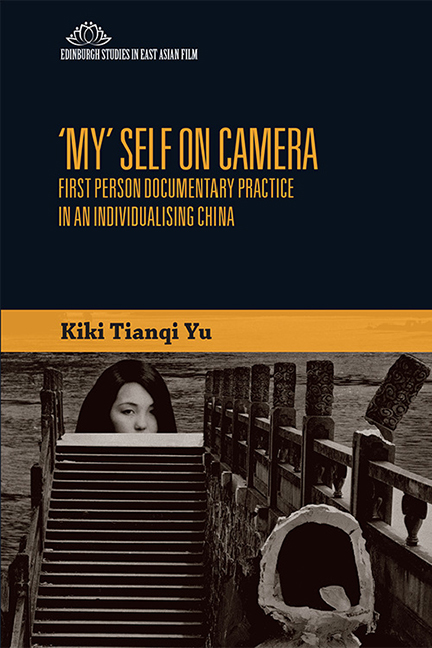Book contents
- Frontmatter
- Contents
- List of Figures
- List of Main Terms with Chinese Translations
- List of Names with Chinese Character Translations
- Acknowledgements
- Dedication
- Introduction: Action, Amateurness and the Changing Sense of the Individual Self
- 1 Female First Person Documentary Practice: Negotiating Gendered Expectations
- 2 Amateurness and an Inward Gaze at Home
- 3 Nostalgia toward Laojia: Old Home as an Imagined Past
- 4 First Person Action Documentary Practice: Longing for a More Politicised Space
- 5 The Problematic Public Self: Ethics, Camera and Language in Contestable Minjian Public Spaces
- 6 Camera Activism: Provocative Documentation, First Person Confrontation and Collective Force
- 7 Whose Self on Camera? Motives, Mistrust, Disputed Authenticities
- 8 From Fragile First Person Documentary Practice to Popular Online First Person Live Streaming Broadcast – Zhibo: Changing Intentions, Changing Individual Selves
- Filmography
- Bibliography
- Index
8 - From Fragile First Person Documentary Practice to Popular Online First Person Live Streaming Broadcast – Zhibo: Changing Intentions, Changing Individual Selves
Published online by Cambridge University Press: 10 November 2020
- Frontmatter
- Contents
- List of Figures
- List of Main Terms with Chinese Translations
- List of Names with Chinese Character Translations
- Acknowledgements
- Dedication
- Introduction: Action, Amateurness and the Changing Sense of the Individual Self
- 1 Female First Person Documentary Practice: Negotiating Gendered Expectations
- 2 Amateurness and an Inward Gaze at Home
- 3 Nostalgia toward Laojia: Old Home as an Imagined Past
- 4 First Person Action Documentary Practice: Longing for a More Politicised Space
- 5 The Problematic Public Self: Ethics, Camera and Language in Contestable Minjian Public Spaces
- 6 Camera Activism: Provocative Documentation, First Person Confrontation and Collective Force
- 7 Whose Self on Camera? Motives, Mistrust, Disputed Authenticities
- 8 From Fragile First Person Documentary Practice to Popular Online First Person Live Streaming Broadcast – Zhibo: Changing Intentions, Changing Individual Selves
- Filmography
- Bibliography
- Index
Summary
I may not be an online celebrity; may not sing well, may not be self-disciplined, may not be brave, may not win, but on Inke, I am definitely myself. Get on Inke, broadcast (zhibo) myself.
Advertising slogan of Inke Zhibo, a live-streaming broadcast platformWhen I began researching first person narrative documentary practice in China, there were not so many films of this kind around and there was a general suspicion of this practice within the independent documentary community, of it being too private or too narcissistic. Little attention had been given to the politicality of this practice: how individual makers communicate through a personal camera with their family, surroundings or society as a social engagement. Focusing on how filmmakers turn the camera inwards on their own selves, this book explores a twofold research question. Firstly, how is the self represented on camera in a contemporary Chinese context and what does the filmic self-representation explore? Secondly, during the process of filmmaking, how does the first person filmmaker position his or her self within complex relations with others, society and the state? Responding to this, I took the film text as an aesthetic and cultural object, and examined how the self is constructed for one's own camera. I also examined first person filmmaking as a practice, through which individual filmmakers as agents experience a process of deconstructing and reconstructing their subjectivities. In addition to the eleven films by nine filmmakers examined in this book, and the China Villagers Documentary Project involving Wu Wenguang and ten village filmmakers, more first person documentary films have emerged in the 2010s during the writing of this book.
From the First Person on Camera to the First Person Online in the 2010s
Since 2010, or even earlier, when Wu Wenguang started to reflect on his own practice in the making of Fucking Cinema, there has been a general move to explore the personal at Caochanghdi Workstation Beijing, which was mentioned in the last chapter, a studio of documentary filmmaking and theatre dancing initiated by Wu Wenguang and Wen Hui, Wu's then long term-partner since the early 1980s, a dancer and filmmaker who was mentioned in the Introduction.
- Type
- Chapter
- Information
- My Self on CameraFirst Person Documentary Practice in an Individualising China, pp. 181 - 197Publisher: Edinburgh University PressPrint publication year: 2018



